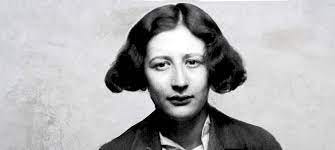What it means to be good
Guest Writer!!! Michelle Hand writes about her struggle with Lent and reconciling one's self to the notion of unconditional love.
An Introductory Note:
Some of the bright spots of this pandemic have been spending evenings with my dear friend Michelle on her porch or beside her fire pit. We have been very careful always keeping distant and even masking up between our sips of wine. I can’t wait to hug her again.
Michelle texted me about a month ago - What do you think of Simone Weil? I told her that while I love the French philosopher and mystic’s ideas and her story, I have a really hard time reading her. Weil is a bit dark for me. She was born into a secular Jewish household at the turn of the century, but became a perennial mystic later in life drawn to Christianity as well as Eastern religious practices. Weil’s life was bookended by world wars which, I’m sure, made her unduly susceptible to the dark night of the soul. Simone Weil died at the age of 34 basically by refusing to eat more than what she had determined the German occupied Frenchman ate. For a person so in tune with suffering Weil talks about its transformational potential. “Attention,” she says, “is the purest form of generosity.”
We have to try to cure our faults by attention and not by will.
The will only controls a few movements of a few muscles, and these movements are associated with the idea of the change of position of nearby objects. I can will to put my hand flat on the table. If inner purity, inspiration or truth of thought were necessarily associated with attitudes of this kind, they might be the object of will. As this is not the case, we can only beg for them… Or should we cease to desire them? What could be worse? Inner supplication is the only reasonable way, for it avoids stiffening muscles which have nothing to do with the matter. What could be more stupid than to tighten up our muscles and set our jaws about virtue, or poetry, or the solution of a problem. Attention is something quite different.
Pride is a tightening up of this kind. There is a lack of grace (we can give the word its double meaning here) in the proud man. It is the result of a mistake.
Attention, taken to its highest degree, is the same thing as prayer. It presupposes faith and love.
Absolutely unmixed attention is prayer.
If we turn our mind toward the good, it is impossible that little by little the whole soul will not be attracted thereto in spite of itself.
- Simone Weil, Gravity and Grace
Embedded in Weil’s ideas is this sense of kenosis, a self-emptying or a letting go. There is the gravity of suffering and the grace of supplication. But this supplication is an open hearted attention to Beauty.
This reminds me of Cynthia Bourgeault’s teaching on the Divine Exchange. There is a divine economy at work. Anything that creates withholding, tension, or like Weil calls it, “a tightening up,” keeps us from receiving fully. But as we practice the flow of letting go and receiving and then letting go again, we become one with the divine dance of abundance.
I asked Michelle if, as she was reading Weil, she wanted to write something for the newsletter. Michelle is an amazing writer and I had selfish motives for asking her to write. She quickly agreed and I’m happy to share with you her essay here. I’m not surprised that in the season of Lent and steeped in the writing of Simone Weil, that Michelle chose to write about the struggle of what it means to be good. For this was Simone’s lifelong journey - to be worthy, to identify with the suffering of others and to ultimately, find her path to God’s full Grace. - Kelley
What it Means to be Good
by Michelle Hand
As we approach this second Sunday of Lent, I find myself struggling—two weeks in and I’ve yet to enact any of the practices the season encourages in preparation for Easter. Noteworthy because I typically look forward to this time—like tumbling out the door after a late night party into the bracing shock of winter air, Lent can shake me from any residual stupor following holiday indulgences and return me to my senses. Fasting reacquaints me with what I truly hunger for, simplifying reveals what I truly have, and self-reflection unmasks who I truly am. Lent, at its best, clarifies.
But there is an aspect of Lent that troubles me. And much like the way I avoid mirrors on Ash Wednesday so as not to be tempted to tidy up the large smear on my forehead, I have often turned away from the troubling concept of penance. Specifically, the way Lenten sacrifices are depicted as privations meant to hurt, to punish—for while penance is supposed to be voluntary, no matter how much we give up, it will never change the fact we are, and remain, fundamentally guilty. There is something about this pandemic year where I feel reluctant to sacrifice anything in the name of punishing myself. It might be that I am weary from having already given up so much. It might also be I am weary of thinking of myself as someone who has been given up on unless I earn my way back.
Maybe Lent and I have always had a misunderstanding. Maybe many of us have.
My dad coached my grade-school basketball team and, had he not, it is unlikely I ever would have made the squad. I was smaller than everyone else, the pebbled ball huge and unweildly in my hands. After a disastrous first practice, he took me aside and said: There will always be players bigger and better than you—but you can stay in the game with hustle. You have to hustle harder than anyone else out there.
And he was right. I sometimes was able to make the play by simply outrunning the bigger and better player. But that relief was always short-lived because I knew my place on the court was uncertain—it had to be earned every second, all my energy directed at insuring the other team never caught on to my weaknesses. How many of us have spent our lives like that? Hustling and striving to prove we are a worthy team player, parent, friend, or spouse? How many churches have been born out of a white-knuckled effort to stave off the fear we might not be good enough in the eyes of God? How many Lenten privations do we have to suffer before we’re finally going to be worthy of Easter?
Richard Rohr claims we come by this misunderstanding honestly—the Reformation saw the circulation of the penal substitutionary atonement theory—whereby Christ by his own sacrificial choice, was punished in the place of humans, thus satisfying the ‘demands of justice’ so that God could forgive our sins. The consequences of the theory are that generations have been led to believe our relationship to God is shaped by a one-time transactional affair between Jesus and his Father instead of an ongoing transformational lesson for the human soul. We have been led to believe if we do the right things—attending fish fries and forsaking coffee and downloading a devotional app—we will somehow earn our place at God’s side. This model has persisted, I think, because while transactional love comes with its existential agonies and pains, it also promises a relatively easy spiritual path. I’ve been guilty of spending many a Lenten season checking off my devotional to-do-list with great satisfaction. When the requisite 40 days had passed, I would drop those practices and slide with relief back into life as it had been before. For Rohr, if we could instead receive Lent as an invitation to be transformed by love rather than punished by those practices—to be challenged by Christ’s life for the sake of insight, healing and restoration—we might finally arrive at Easter as intended.
Seems an elegant solution, no? So why does my heart flutter to my throat at the mention of the word transformation? Maybe because I’m all for a renovation project—there is a relief in using Lent to address the cracks and crumbling corners in myself. In part because I don’t have to spend so much time slamming doors when I keep company in fear they might see what a mess lies behind them. In greater part, because I do not know how to reconcile my own sense of who I’d love to be with loving who I am. What if the transformation does not include improvement? How can Christ take all of me in and not find me wanting—after all this time, all this hustle, how can what is there already be enough? That feels like a desert too far to cross.
How do we reconcile ourselves to unconditional love? How do we recover from the lifelong consequences of being confused about what love—worthiness—really looks like? Simone Weil says we can recover in this way. Consider God’s love for us is not the reason for which we should love him. God’s love for us is the reason for us to love ourselves. How could we love ourselves without this motive? How can we indeed.
God’s love for us is not the reason for which we should love him. God’s love for us is the reason for us to love ourselves. How could we love ourselves without this motive?
- Simone Weil
Perhaps in this pandemic time outside of time, where so much of what I have always known and always done has already slipped away, the moment is right to give up my old notions of Lent. After all, I’ve already discovered that the pleasures I once might have considered obstacles to Easter—a glass of wine, fresh baked bread, sleeping in on Sundays—have been the very things keeping my spirit intact this year. Perhaps I will still read my devotional passage each morning and follow it with a poem, like this one from Mary Oliver that I have come to again and again, amen.
You do not have to be good.
You do not have to walk on your knees
For a hundred miles through the desert, repenting.
You only have to let the soft animal of your body
love what it loves.







